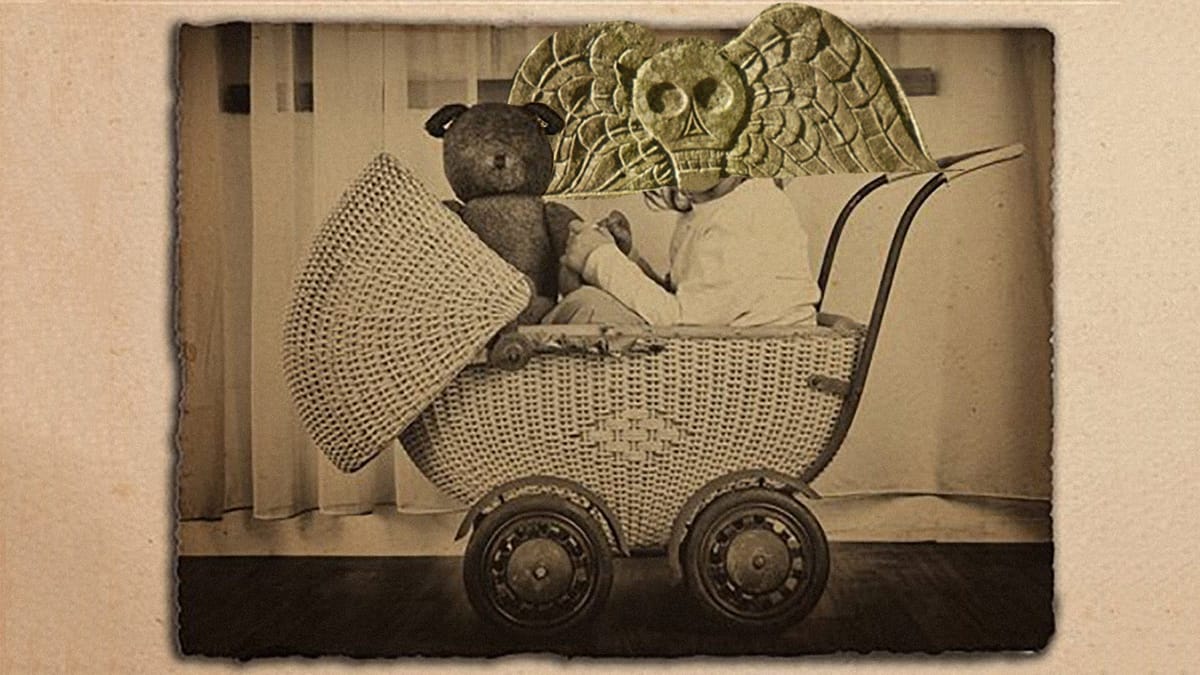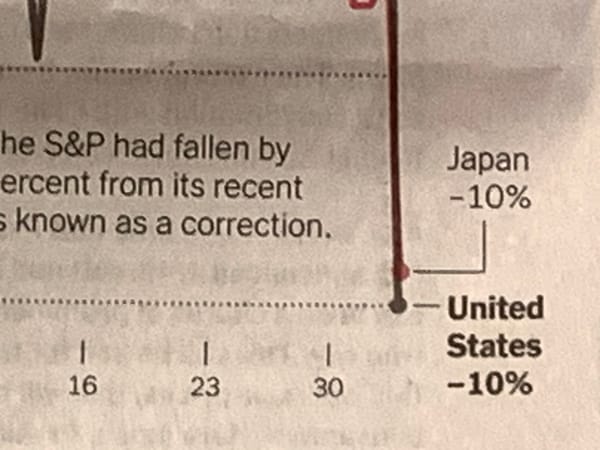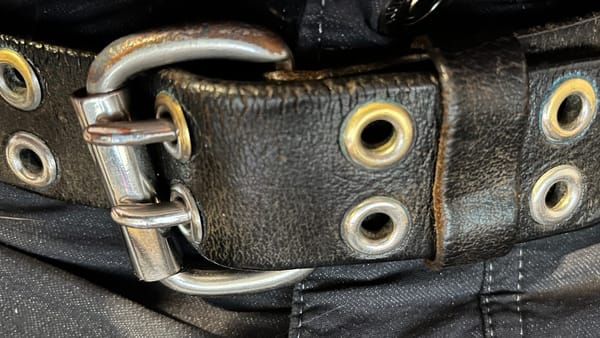Your Real Biological Clock Is You’re Going to Die
An Essay From the Hmm Daily Archive

This essay was originally published on Hmm Daily, a predecessor publication to Indignity, in 2018.
IN APRIL, IN a small town on a small island in a small string of islands trailing down from the main part of Japan, the world’s then-oldest person died. Nabi Tajima was 117 years old—the last surviving human being born in the 19th century.
Maybe the year 1900 sounds far away, to you. It comes closer. My father was born in 1940. Right now, I am 47 years old. Everyone who was 47 years old when my father was born is now dead. All of them. That entire group of middle-aged people, who made up the adult world when my father was a child, is gone.
My father is dead, now, too. He smoked, and it shortened his life. But I lived with him, grew up with him. I was an adult with him. We drank coffee at the dining room table together, read the newspaper, talked on the phone. He sat and talked with my firstborn son when he was little. He held my second-born, as a baby, while he could. The older boy remembers him.
The younger boy is seven now. When my father was a boy of seven, Nabi Tajima was 47. I keep sliding the numbers around, and as I do, they shove each other out of the way. The people don’t all fit.
Twelve years ago, I had not thought about any of this at all. I was 35. My wife would soon be pregnant, for the first time. We had dated for a good long while, been engaged for a good long while, been married for a good long while. We had bought a house in the suburbs and then we had sold it and moved overseas. It was all a sensibly paced series of life events, at appropriate-seeming times.
It did not occur to me, in any real way, that as we did this, we were spending down a limited resource. In our social world, in our cultural class, at our point in history, people are brought up to take the opposite view, to structure their lives as if time were something a person accumulated. One is wary of getting married too soon, of having children too young. Adulthood is a condition to enter cautiously and gradually.
From certain angles, this breeds disdain—penniless millennials eating avocado toast, forty-year-old men skateboarding in sneakers and t-shirts, slovenly and undisciplined generations refusing to commit to lives and careers. But the complaining is halfhearted, a way for the older cohort to convince itself the younger cohort might be safely held at bay. And to point out the shortcomings of adult-aged people is, at bottom, to argue that maturity is something rarefied. The figure of the kidult exists as a warning that you should not move on to the next step until you’re certain you’re ready.
But this idea of certainty is a sham, a distraction, something to turn your attention away from the only truly certain thing, which is that your time will run out. If you intend to have children, but you don’t intend to have them just yet, you are not banking extra years as a person who is still too young to have children. You are subtracting years from the time you will share the world with your children.
All our conversations about choices and priorities and life decisions are held in the shadow of the great constraint. The closest the discussion usually comes to it is the subject of women’s anatomy, the aging of eggs, the decline of female fertility. Sometimes, for the broad-minded, there may be some mention of the fading quality of men’s sperm, as well. The possibility that it might not happen at all—that a particular body might not be able, or might fall ill, or might die first—is almost unspeakable, and for planning purposes goes unspoken.
Instead, life and the making of more life appears as a technical problem; where the body’s ability to stall falters, cryogenics can take over. Perhaps zygotes can be spun up from ordinary DNA. Science is doing its best to push back the limits. Look to the wealthy and the entitled and see the future: Mick Jagger just sired a baby at age 73.
Now look to the future: when that baby turns 10, Mick Jagger will be 83. When that baby turns 20, Mick Jagger will be 93. When that baby turns 30, 40, 45—Mick Jagger will be almost certainly dead, all but definitely dead, unquestionably dead.
As the child of a spectacularly wealthy man, Mick Jagger’s baby will surely be provided for. But not by its dad, not in person.
Did we choose the age at which we would have children? What does it mean to choose? We use the language of autonomy to avoid thinking about powers that shape our existence. Our civilization is remarkably hostile to the needs of life, from the helplessness of babyhood to the frailty of old age. The system is set up for healthy, productive, independent individuals, and one absorbs the lesson that one should try to stay in this class as long and as securely as one can.
So we wait until we are ready. There are good reasons to wait, or reasons that appear to be good once you accept the underlying terms. My children have not had to live with parents who are working 15-hour days, the way we worked in our 20s, or who are financially desperate, as we might have been if we’d been paying for children on the salaries of our 20s. Our professional standing allows us to skip work for pediatric appointments or parent-teacher conferences. We can afford to hire babysitters. I got a promotion and a big raise just when it was time to buy a piano. We all sit down together for home-cooked meals most evenings and talk about things.
I hope someday my children can do the same things for their own children. Maybe I’ll see them do it, but maybe I won’t: If my firstborn waits till he’s 35, going on 36, to have a child, the way I did, my grandchild will arrive the year I would turn 71. When that grandchild finishes fifth grade, I’ll be due to turn 81. And that would be the first of my grandchildren.
Are you ready to have a child? Take your age right now and add 18. And nine months, if you want to get particular about it, but call it 18. That’s how old you’ll be for high school graduation. Add 25 and picture yourself traveling to visit your grown-up child in a new city. Add 30. Add 40.
The clock is running, only it’s not a clock: It’s a sandglass. According to the Social Security Administration’s online calculator, an average man born the day I was born can expect to live 34.9 more years, for a total of 82.0 years. When I first checked it, when drafting this piece, it was 35.4. I thought it would be a lighthearted exercise, but I felt real dread as I was entering the birthdate, and, despite myself, shock when I saw how small the number was.
When I was 34.9 years old, I felt like I had just settled into life. What lies ahead is the un-settling, the inverse of the question of when you feel old enough to have a baby: When will your children be old enough to have dying parents? The later you take on your intergenerational responsibilities, the sooner you hand them off. If I hit the Social Security Administration projection, my older son will be 46 when I go.
It’s possible to beat the projection. The longer you live, the longer you can expect to live; if I make it to 70, the calculator says, then I can look forward to making it to 86.7. Ten more presidential cycles, one more visit from Comet Tempel-Tuttle, maybe a driver’s license for my oldest grandchild. You can take extreme measures—inject yourself with teenage blood, or get elected to the United States Senate—but at best that will push things back to the hard limit. If I last as long as Nabi Tajima, I still won’t see the 22nd century.
This world devours every person and moves on. It does not stop moving, even as we pass through the middle of life telling ourselves it is the front end. Before the children arrived, there was not much difference from one year to the next. In some ways, in the adult, professional sphere, there still is not much difference. In a chair, at a computer screen, 47 doesn’t feel that far from 37. A little trouble in the lumbar region, that’s all. Some wiry gray at the temples in the bathroom mirror.
This is the illusion of adult timekeeping, and children make it unsustainable. Life moves along at an unexceptional, unexamined pace and suddenly it’s the first day of school, and then it’s the first day of school again. The jeans I remember just buying him are up above the ankles. The younger boy kisses me back when I kiss him good night, but by last year the older boy started to twist away from holding hands a few yards before the school door, to dart off ahead. Now he just walks to school on his own. There’s time still for him to circle back for a hug at day’s end. Someday, though, a hug will be the last one.






